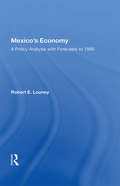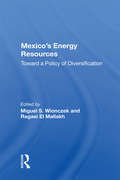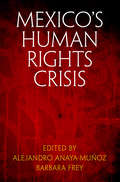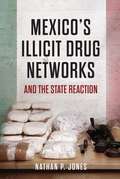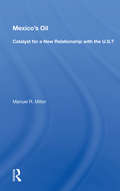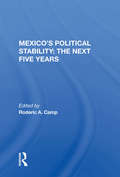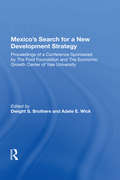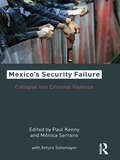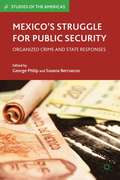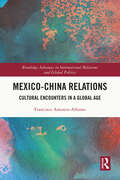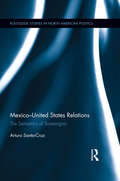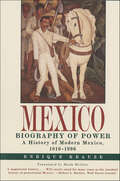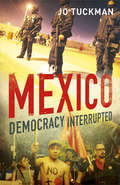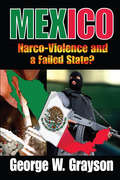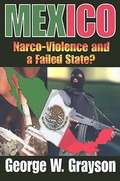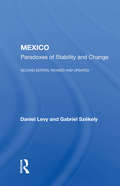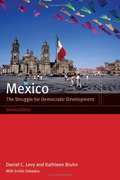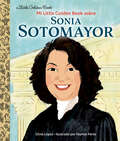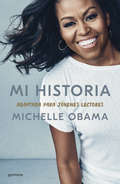- Table View
- List View
Mexico's Economy: A Policy Analysis With Forecasts To 1990
by Robert E. LooneyIn the spring of 1976, I had the privilege of serving on a Stanford Research Institute team engaged in examining various facets of the Mexican economy. That study provided the opportunity to visit many government ministries and talk with some of Mexico's leading economists. These professional experiences stimulated me to undertake full-scale research on the growth potential of the Mexican economy, a subject in which I had long been interested and on which I had written from time to time, beginning with my book Income Distribution Policies and Economic Growth in Semi-Industrialized Countries: A Comparative Study of Iran, Mexico, Brazil, and South Korea. 1 The present volume might be regarded as the culmination of this endeavor. The methodological approach here is partly descriptive and partly empirical-illustrative formal models are built on both qualitative and theoretical foundations. To sharpen the issue and put the Mexican economy in perspective, international comparisons are made through-out.
Mexico's Energy Resources: Toward A Policy Of Diversification
by Miguel S. Wionczek Ragaei El MallakhBeginning from the premise that Mexico's economic strength will depend largely on its ability to produce, manage, and export energy, energy experts in this book analyze energy planning in Mexico in the 1970s and possible strategies for the future. They focus on the potential for diversifying the country's energy economy--now based almost exclusively on oil--by examining alternative sources, particularly natural gas, coal, and geothermal and solar resources. The extent to which Mexico's energy base is diversified, they assert, will determine the country's ability both to meet internal energy needs and to prolong its export of oil and gas. find, diversification will not only increase Mexico's economic strength, but will also expand the global supply of energy resources and have profound impact on the United States, Mexico's major trading partner.
Mexico's Human Rights Crisis (Pennsylvania Studies in Human Rights)
by Alejandro Anaya-Muñoz Barbara FreyLawless elements are ascendant in Mexico, as evidenced by the operations of criminal cartels engaged in human and drug trafficking, often with the active support or acquiescence of government actors. The sharp increase in the number of victims of homicide, disappearances and torture over the past decade is unparalleled in the country's recent history. <P><P>According to editors Alejandro Anaya-Muñoz and Barbara Frey, the "war on drugs" launched in 2006 by President Felipe Calderón and the corrupting influence criminal organizations have on public institutions have empowered both state and nonstate actors to operate with impunity. Impunity, they argue, is the root cause that has enabled a human-rights crisis to flourish, creating a climate of generalized violence that is carried out, condoned, or ignored by the state and precluding any hope for justice.Mexico's Human Rights Crisis offers a broad survey of the current human rights issues that plague Mexico. <P><P>Essays focus on the human rights consequences that flow directly from the ongoing "war on drugs" in the country, including violence aimed specifically at women, and the impunity that characterizes the government's activities. Contributors address the violation of the human rights of migrants, in both Mexico and the United States, and cover the domestic and transnational elements and processes that shape the current human rights crisis, from the state of Mexico's democracy to the influence of rulings by the Inter-American Court of Human Rights on the decisions of Mexico's National Supreme Court of Justice. <P><P>Given the scope, the contemporaneity, and the gravity of Mexico's human rights crisis, the recommendations made in the book by the editors and contributors to curb the violence could not be more urgent. <P><P>Contributors: Alejandro Anaya-Muñoz, Karina Ansolabehere, Ariadna Estévez, Barbara Frey, Janice Gallagher, Rodrigo Gutiérrez Rivas, Susan Gzesh, Sandra Hincapié, Catalina Pérez Correa, Laura Rubio Díaz-Leal, Natalia Saltalamacchia, Carlos Silva Forné, Regina Tamés, Javier Treviño-Rangel, Daniel Vázquez, Benjamin James Waddell.
Mexico's Illicit Drug Networks and The State Reaction
by Nathan P. JonesMexican drug networks are large and violent, engaging in activities like the trafficking of narcotics, money laundering, extortion, kidnapping, and mass murder. Despite the impact of these activities in Mexico and abroad, these illicit networks are remarkably resilient to state intervention. Drawing on extensive fieldwork and interviews with US and Mexican law enforcement, government officials, organized crime victims, and criminals, Nathan P. Jones examines the comparative resilience of two basic types of drug networks--"territorial" and "transactional"--that are differentiated by their business strategies and provoke wildly different responses from the state. Transactional networks focus on trafficking and are more likely to collude with the state through corruption, while territorial networks that seek to control territory for the purpose of taxation, extortion, and their own security often trigger a strong backlash from the state. Timely and authoritative, Mexico's Illicit Drug Networks and the State Reaction provides crucial insight into why Mexico targets some drug networks over others, reassesses the impact of the war on drugs, and proposes new solutions for weak states in their battles with drug networks.
Mexico's Oil: Catalyst For A New Relationship With The U.s.?
by Manuel R. MillorAnalyzing the effects of Mexico's newly flourishing petroleum industry, Dr. Millor first traces the evolution of Mexico's oil development and provides a detailed assessment of its socioeconomic, political, and ecological consequences and of the Mexican government's current energy policies. In his subsequent examination of U.S.-Mexican relations, he emphasizes that, aside from the issues directly related to Mexico's petroleum, a complex assortment of concerns remain unresolved between the two nations—illegal immigration, drug traffic, terms of technical and scientific cooperation, restrictions on Mexican exports in the U.S. market, and the more assertive foreign policy stance recently taken by Mexico. Dr. Millor argues that, far from representing a clear case of positive growth for Mexico, petroleum could bring about distorted development and increased dependency, as well as a difficult period of relations with the U.S. If a stable association between the two governments is to emerge, he concludes, U.S. policymakers must understand the changes taking place in Mexico and accept its emergence as a middle power with autonomous goals. Representing both the Mexican and the U.S. point of view, this study contributes much to a better understanding of the significance of oil for Mexican development and to a balanced assessment of present and future U.S.-Mexican relations.
Mexico's Political Stability: The Next Five Years
by Roderic A. CampMexico is undergoing its worst economic cr1s1s since the world depression of the 1930s. In this volume contributors analyze significant patterns that might affect political stability and legitimacy, economic viability, and social change over the next several years, often reaching controversial conclusions. They argue, for example, that the military is not likely to change its present civil-military role; that political opposition, rather than political violence or pressure from foreign governments, will have the most profound influence on the changing pattern of political legitimacy and system stability; and that decision-making in the private sector may have the greatest potential to resolve or exacerbate the current crisis. Finally, they suggest that because economic conditions have been altered so dramatically in the recent period, Mexican policymakers will need to develop a new range of political alternatives to stabilize the economy and redirect the country's future.
Mexico's Search For A New Development Strategy
by Dwight S. BrothersPapers commissioned for the Yale/Mexico Conference (New Haven, April, 1989) are organized around four themes: the economic and socio-political context; contemporary macroeconomic issues; alternative development strategies, and; financial sector reform agenda.
Mexico's Security Failure: Collapse into Criminal Violence
by Paul Kenny Mónica Serrano Arturo SotomayorMexico has failed to achieve internal security and poses a serious threat to its neighbors. This volume takes us inside the Mexican state to explain the failure there, but also reaches out to assess the impact of Mexico’s security failure beyond its borders. The key innovative idea of the book—security failure—brings these perspectives together on an intermestic level of analysis. It is a view that runs counter to the standard emphasis on the external, trans-national nature of criminal threats to a largely inert state. Mexico’s Security Failure is both timely, with Mexico much in the news, but also of lasting value. It explains Mexican insecurity in a full-dimensional manner that hasn’t been attempted before. Mexico received much scholarly attention a decade ago with the onset of democratization. Since then, the leading topic has become immigration. However, the security environment compelling many Mexicans to leave has been dramatically understudied. This tightly organized volume begins to correct that gap.
Mexico's Struggle for Public Security
by George Philip Susana BerruecosThe Mexican government's full-frontal attack on the powerful drugs cartels has achieved mixed results. This book considers the issue from a variety of viewpoints. The essential argument is that the organized crime is best combated by institutional reforms directed at strengthening the rule of law rather than by a heavy reliance on armed force.
Mexico-China Relations: Cultural Encounters in a Global Age (Routledge Advances in International Relations and Global Politics)
by Francisco Antonio-AlfonsoThis book analyses contemporary Mexico-China relations as a complex cultural encounter.Through an unprecedented analysis of the discursive production of a series of diplomatic, media and academic sources, this book demonstrates how, embedded in the great technological and political transformations of our transition into the 21st century, Mexico-China relations embodied a complex process of knowledge formation, confronting their socially constructed conceptions of time, space and otherness: a cultural encounter. The book advances the idea that the cultural encounter between Mexico and China provides a fundamental case for understanding world politics and human interaction from a truly global perspective and beyond reductionist views of reality. Unlike previous works, which have predominantly focused on economics or geopolitics – strongly influenced by a realist approach – the book will present the subject as a dynamic interaction between ideological and material factors.Mexico-China Relations contributes to the study of otherness construction and critical understanding of the non-Western world in international relations (IR). It will appeal to researchers and students of IR theory, political theory, cultural studies and studies of the impact of cultural influences on foreign policy, as well as professionals working on Sino-Latin American relations.
Mexico-United States Relations: The Semantics of Sovereignty (Routledge Studies in North American Politics)
by Arturo Santa-CruzSovereignty is a key factor to consider when studying the Mexico-United States relationship. During most of the twentieth century, as a result of the new character of the Mexican post-revolutionary regime, there was a decoupling between the state’s maximalist discourse on sovereignty, and its practice. Sovereignty as an undifferentiated whole does not exist; it should instead be disaggregated into the myriad issue areas in which it is constantly negotiated. Focusing on a tripartite classification relating to the construction of Mexico’s sovereignty towards its northern neighbor since 1920, this volume illustrates how Mexico’s sovereignty has varied not only according to the times, but also according to the issues at stake. In doing so, Arturo Santa-Cruz comprehensively covers a variety of issues in the bilateral agenda such as drug trafficking, electoral observation, human rights, investment, migration, security, and trade, as well as some defining moments in the relationship, such as the 1923 US granting of recognition to the Mexican post-revolutionary regime, the 1938 oil nationalization, the 1982 debt crisis, and the 1995 financial bailout. These diverse cases, analyzed through an original analytical approach, capture sovereignty’s multifocal meaning.
Mexico: A History of Modern Mexico, 1810–1996
by Enrique KrauzeThe concentration of power in the caudillo (leader) is as much a formative element of Mexican culture and politics as the historical legacy of the Aztec emperors, Cortez, the Spanish Crown, the Mother Church and the mixing of the Spanish and Indian population into a mestizo culture. Krauze shows how history becomes biography during the century of caudillos from the insurgent priests in 1810 to Porfirio and the Revolution in 1910. The Revolutionary era, ending in 1940, was dominated by the lives of seven presidents -- Madero, Zapata, Villa, Carranza, Obregon, Calles and Cardenas. Since 1940, the dominant power of the presidency has continued through years of boom and bust and crisis. A major question for the modern state, with today's president Zedillo, is whether that power can be decentralized, to end the cycles of history as biographies of power.
Mexico: Democracy Interrupted
by Jo TuckmanIn 2000, Mexico's long invincible Institutional Revolutionary Party (PRI) lost the presidential election to Vicente Fox of the National Action Party (PAN). The ensuing changeover—after 71 years of PRI dominance—was hailed as the beginning of a new era of hope for Mexico. Yet the promises of the PAN victory were not consolidated. In this vivid account of Mexico's recent history, a journalist with extensive reporting experience investigates the nation's young democracy, its shortcomings and achievements, and why the PRI is favored to retake the presidency in 2012. Jo Tuckman reports on the murky, terrifying world of Mexico's drug wars, the counterproductive government strategy, and the impact of U. S. policies. She describes the reluctance and inability of politicians to seriously tackle rampant corruption, environmental degradation, pervasive poverty, and acute inequality. To make matters worse, the influence of non-elected interest groups has grown and public trust in almost all institutions—including the Catholic church—is fading. The pressure valve once presented by emigration is also closing. Even so, there are positive signs: the critical media cannot be easily controlled, and small but determined citizen groups notch up significant, if partial, victories for accountability. While Mexico faces complex challenges that can often seem insurmountable, Tuckman concludes, the unflagging vitality and imagination of many in Mexico inspire hope for a better future.
Mexico: Financial Sector Assessment Program Update--Detailed Assessment of Compliance with the Basel Core Principles for Effective Banking Supervision and Transparency of Banking Supervision
by International Monetary FundA report from the International Monetary Fund.
Mexico: Financial Sector Assessment Program Update--Detailed Assessment on the Implementation of the IOSCO Objectives and Principles of Securities Regulation
by International Monetary FundA report from the International Monetary Fund.
Mexico: Narco-Violence and a Failed State?
by George W. Grayson* Mexico was named an Outstanding Academic Title of 2010 by Choice Magazine.Bloodshed connected with Mexican drug cartels, how they emerged, and their impact on the United States is the subject of this frightening book. Savage narcotics-related decapitations, castrations, and other murders have destroyed tourism in many Mexican communities and such savagery is now cascading across the border into the United States. Grayson explores how this spiral of violence emerged in Mexico, its impact on the country and its northern neighbor, and the prospects for managing it.Mexico's Institutional Revolutionary Party (PRI) ruled in Tammany Hall fashion for seventy-nine years before losing the presidency in 2000 to the center-right National Action Party (PAN). Grayson focuses on drug wars, prohibition, corruption, and other antecedents that occurred during the PRI's hegemony. He illuminates the diaspora of drug cartels and their fragmentation, analyzes the emergence of new gangs, sets forth President Felipe Calderi?1/2n's strategy against vicious criminal organizations, and assesses its relative success. Grayson reviews the effect of narcotics-focused issues in U.S.-Mexican relations. He considers the possibility that Mexico may become a failed state, as feared by opinion-leaders, even as it pursues an aggressive but thus far unsuccessful crusade against the importation, processing, and sale of illegal substances.Becoming a failed state involves two dimensions of state power: its scope, or the different functions and goals taken on by governments, and its strength, or the government's ability to plan and execute policies. The Mexican state boasts an extensive scope evidenced by its monopoly over the petroleum industry, its role as the major supplier of electricity, its financing of public education, its numerous retirement and health-care programs, its control of public universities, and its dominance
Mexico: Narco-violence and a Failed State?
by George W. Grayson* Mexico was named an Outstanding Academic Title of 2010 by Choice Magazine. Bloodshed connected with Mexican drug cartels, how they emerged, and their impact on the United States is the subject of this frightening book. Savage narcotics-related decapitations, castrations, and other murders have destroyed tourism in many Mexican communities and such savagery is now cascading across the border into the United States. Grayson explores how this spiral of violence emerged in Mexico, its impact on the country and its northern neighbor, and the prospects for managing it. Mexico's Institutional Revolutionary Party (PRI) ruled in Tammany Hall fashion for seventy-nine years before losing the presidency in 2000 to the center-right National Action Party (PAN). Grayson focuses on drug wars, prohibition, corruption, and other antecedents that occurred during the PRI's hegemony. He illuminates the diaspora of drug cartels and their fragmentation, analyzes the emergence of new gangs, sets forth President Felipe Calder�n's strategy against vicious criminal organizations, and assesses its relative success. Grayson reviews the effect of narcotics-focused issues in U. S. -Mexican relations. He considers the possibility that Mexico may become a failed state, as feared by opinion-leaders, even as it pursues an aggressive but thus far unsuccessful crusade against the importation, processing, and sale of illegal substances. Becoming a "failed state" involves two dimensions of state power: its scope, or the different functions and goals taken on by governments, and its strength, or the government's ability to plan and execute policies. The Mexican state boasts an extensive scope evidenced by its monopoly over the petroleum industry, its role as the major supplier of electricity, its financing of public education, its numerous retirement and health-care programs, its control of public universities, and its dominance over the armed forces. The state has not yet taken control of drug trafficking, and its strength is steadily diminishing. This explosive book is thus a study of drug cartels, but also state disintegration.
Mexico: Paradoxes Of Stability And Change--second Edition, Revised And Updated
by Daniel LevyIn the four years since the first edition was published, Mexico's political system—exceptional among Latin American nations—has been severely tested. The administration has been struggling to cope with the effects of a depressed market for oil, the demands of an increasingly vocal opposition, and the foreign policy challenges posed by violence in Central America. In this timely second edition of a work that has received favorable attention in the United States and in Mexico, the authors extend their analysis of Mexico's current and future prospects to cover the dramatic developments of the past few years. Throughout, the authors have updated their discussion to assess the social and political impact of the latest elections, the recent earthquakes, and the continuing cycle of economic crisis, recovery, and renewed crisis. They also pay special attention to Mexico's initiatives for peace in Central America and to recent shifts in Mexican-U.S. relations. Appropriate for courses in Mexican studies, Latin American politics, and Third World development, this text also will be of value to anyone interested in Mexico's political and economic affairs.
Mexico: The Struggle for Democratic Development (2nd edition)
by Kathleen Bruhn Daniel C. Levy Emilio ZebadúaProvides a broad and accessible analysis of Mexico's contemporary struggle for democratic development and it brings up to date issues ranging from electoral reform and accountability to drug trafficking, migration, and NAFTA.
Mi Little Golden Book Sobre Sonia Sotomayor (Little Golden Book)
by Silvia LopezHelp your little one dream big with a Spanish language Little Golden Book biography about Supreme Court Justice Sonia Sotomayor! The perfect introduction to nonfiction for preschoolers!This Spanish edition Little Golden Book about Sonia Sotomayor--the first Latina Supreme Court Justice of the United States--is an inspiring read-aloud for young children. Look for Little Golden Book biographies about these other inspiring people:• Joe Biden• Kamala Harris• Barack Obama• Queen Elizabeth II • Dr. Fauci • Ruth Bader Ginsburg• Martin Luther King Jr.• George Washington• Abraham Lincoln
Mi camino
by María Eugenia Vidal«Yo creo que es mejor tomar otro camino, más difícil, más largo, menos popular: el camino de tratar de entender al otro, de escuchar en serio en lugar de dar una respuesta automática, de querer que la sociedad elija por convicción, no porque el otro es malo, sino porque nosotros somos mejores, aun cuando eso suponga un riesgo. Esto es para mí la política».María Eugenia Vidal «La gente nos demanda más humildad, nos demanda un proyecto en serio, nos demanda que la política no sea un lugar oscuro donde es difícil encontrar grandeza y generosidad, sino un lugar transformador, donde se puede cambiar la realidad. No son cambios fáciles para la política ni para la sociedad. No hay una sino muchas grietas construidas desde la desconfianza en el otro y desde la comodidad que otorga el prejuicio: es mucho más fácil hacer política si hay buenos y malos. Corruptos y honestos. Neoliberales y populistas. Ricos y pobres. Indiferentes y sensibles.Esta actitud nos trajo hasta acá y nos hace volver una y otra vez al mismo lugar. Yo creo que es mejor tomar otro camino, más difícil, más largo, menos popular: el camino de tratar de entender al otro, de escuchar en serio en lugar de dar una respuesta automática, de querer que la sociedad elija por convicción, no porque el otro es malo, sino porque nosotros somos mejores, aun cuando eso suponga un riesgo. Esto es para mí la política».María Eugenia Vidal
Mi camino por el mundo occidental
by Wael El-Manzalawy F L Translation Interpreting ServicesPrefacio Me interesaban mucho la política y las noticias. Y el resultado fue que sentía que los pueblos occidentales nos odiaban. Si bien generalizar es un error común, yo fui víctima de ese error; escuchaba las noticias y generalizaba mis sentimientos: todos los occidentales nos odian y quieren destruir nuestros países. Desde 2003, comencé a utilizar Internet. Traté con muchos occidentales y, de a poco, mis sentimientos cambiaron. Los invito a leer este libro y a descubrir mi camino por el mundo occidental.
Mi hermano es un marginado - libro 3: Verdad, coraje y justicia (Mi hermano es un marginado #3)
by Katrina KahlerEl excitante desenlace de la historia de Zoe y Logan. No voy a adelantaros nada en esta descripción… Simplemente os diré que es emocionante ver cómo las personas bajo una inmensa presión y en situaciones que amenazan la vida a menudo consiguen levantarse y dar lo mejor de sí mismas.
Mi historia, adaptada para jóvenes lectores
by Michelle ObamaAdaptada para jóvenes lectores, esta es la inspiradora biografía de la que fue la primera dama de Estados Unidos, Michelle Obama. Michelle Robinson nació en el lado sur de Chicago. A pesar de sus humildes orígenes, llegaría a ser Michelle Obama, la inspiradora y poderosa primera dama de Estados Unidos. Junto con su marido, Barack Obama, elegido el cuadragésimo cuarto presidente, serían la primera familia negra en la Casa Blanca, y desde allí servirían al país durante dos mandatos. Michelle es ejemplo de que, con perseverancia y esfuerzo, no hay límites; de origen humilde, llegó a estudiar en la Universidad de Princeton y, más adelante, se graduó en derecho en Harvard. La vida le cambió por completo cuando su marido, Barack Obama, llegó a la presidencia de los Estados Unidos y ella tuvo que aprender a conjugar su faceta de mujer trabajadora, esposa y madre con la de Primera Dama. Este es un relato honesto y fascinante de la vida de Michelle Obama dirigido a jóvenes lectores a quienes ella pregunta: >
Mi marido y yo: Toda la verdad del matrimonio de Isabel II y Felipe de Edimburgo
by Ingrid SewardToda la verdad sobre el matrimonio de Isabel II y Felipe de Edimburgo Tras el reciente fallecimiento del duque de Edimburgo y después del del éxito de la serie The Crown, Ingrid Seward revela la verdadera historia de la reina Isabel y el príncipe Felipe. El romance y la magnífica boda entre el apuesto teniente naval y la joven princesa Isabel supusieron una explosión de color en una nación sumida en los traumas de la posguerra. En Mi marido y yo encontramos una visión reveladora de su relación a puerta cerrada durante más de setenta años. A lo largo de este tiempo, la pareja ha tenido que lidiar con debates feroces sobre cómo criar a sus hijos, rumores de problemas matrimoniales, divorcios escandalosos y muertes impactantes. Este libro arroja nueva luz sobre su relación y sobre el impacto que ha tenido tanto en su familia como en la nación británica. «Ha sido, sencillamente, mi fuerza y apoyo durante todos estos años, y yo, y toda su familia, y tanto este como muchos otros países, tenemos una deuda con él mucho mayor de la que él nunca reclamaría, o de la que nosotros seríamos conscientes». Tributo de la reina Isabel al príncipe Felipe «Después de muchos años escribiendo sobre la familia real, entre las preguntas que con más frecuencia se me plantean están: "¿Cómo son como pareja la reina y el duque de Edimburgo? ¿Cómo es su matrimonio? ¿Cómo son como padres y abuelos?". En resumen, si uno les despoja de toda la formalidad de la realeza y del protocolo que acompaña a esta, ¿cómo son de verdad? Con el éxito de la serie televisiva The Crown, a toda una nueva generación se le ha abierto el interés por la parte personal de sus vidas. Al haber estado cerca de la reina y del duque durante los últimos treinta años, y haberme encontrado con ellos en muchas ocasiones, me siento capaz de proporcionar una perspectivaúnica de sus vidas». Ingrid Seward
